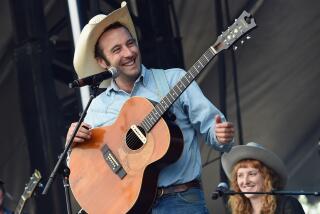Derek Bell, 66; Irish Harpist for the Chieftains
- Share via
Irish harpist Derek Bell, whose impish sense of humor was often masked behind a staid visage during his 30 years with a traditional Irish music band, the Chieftains, died unexpectedly this week in Phoenix. He was 66.
The cause of Bell’s death and even the day he died were not immediately known, said Michelle Findlay, who represents the multiple Grammy-winning Chieftains for Vancouver-based Macklam/Feldman Management. He would have turned 67 on Monday.
The group, celebrating its 40th anniversary this year, had just finished taping a television special in Nashville in conjunction with its latest album, “Down the Old Plank Road: The Nashville Sessions,” the group’s second collaboration with American country music stars.
Bell had remained in the country for a routine physical and minor surgery, but had been cleared by doctors to return to Ireland.
Findlay said no other details about the surgery were available.
“His death comes as a great shock to all those close to him,” the band said in a statement Thursday. “His passing will leave a silence that will never be filled. Anyone who has had the honor of meeting Derek will know that the world will be a much less interesting place without him. We will all miss him terribly.”
The statement was signed by Chieftains founder and leader Paddy Moloney, fiddlers Sean Keane and Martin Fay, flutist Matt Molloy, singer-percussionist Kevin Conneff, and former members Michael Tubridy and Sean Potts.
Although Bell brightened Chieftains shows with displays of dry humor, such as the loud argyle socks he wore to offset his conservative suits, Bell was an exceptional harpist and keyboardist whose tastes encompassed ancient folk music, Mozart and Scott Joplin.
He regularly tickled audiences in concerts by dropping the air of restrained professionalism, frequently feigning to walk off stage when Moloney made references to other harpists, or jokingly disparaged his fashion sense. Or he would liven one of the traditional Irish reels the Chieftains specialized in with a piano break that referenced ragtime master Fats Waller or jazz great Oscar Peterson.
He is credited with helping rejuvenate interest in the Irish harp, one of the traditional instruments whose popularity waned after World War II when rock music swept the country, as it had the rest of the world.
Bell recorded dozens of albums with the Chieftains that championed the country’s musical heritage. He was central to their 1993 album “The Celtic Harp,” a tribute to 17th and 18th century musicologist Edward Bunting, who created the Belfast Harp Society in 1813.
The album was an anomaly among the Chieftains’ far-reaching projects over the last two decades, when the ensemble reached beyond traditional Irish music to explore the ripples from the 19th century Irish diaspora in cultures around the world.
The group had also expanded its sound, collaborating with dozens of guests including Irish classical flutist James Galway, Irish rocker Van Morrison in a watershed 1988 collaboration, and dozens of high-profile partners on individual tracks, including the Rolling Stones, Jackson Browne, Elvis Costello, Linda Ronstadt, Los Lobos and Ry Cooder.
Bell also recorded at least half a dozen solo albums, including two devoted to the music of 17th century Irish harpist-composer Turlough O’Carolan and one featuring his own compositions. He appeared as a guest on albums by numerous other pop, folk and classical artists.
He was born in Belfast and got his earliest musical training from his father, a fiddler.
He studied piano, xylophone and reed instruments including oboe and the English horn.
He received a degree from Royal College of Music in London in 1957 and a bach- elor of music degree from Dublin’s Trinity College in 1959. Bell spent 11 years working with the chorus of the Northern Ireland Radio & TV Orchestra, and in 1970 began teaching harp at the Belfast Academy of Music and Dramatic Art.
His first job was as manager of the City of Belfast Symphony Orchestra in the late 1950s and he was in his 30s before being introduced to the Irish harp by fellow musician Alan Tongue, who also introduced him to the Chieftains. His first recording after joining the group in 1972 was on its “Chieftains 4” album.
Bell is survived by his wife, Stephanie, his mother and two sisters. No funeral or memorial services have been set.
More to Read
The biggest entertainment stories
Get our big stories about Hollywood, film, television, music, arts, culture and more right in your inbox as soon as they publish.
You may occasionally receive promotional content from the Los Angeles Times.








